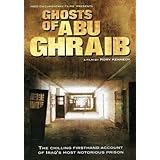
Average Reviews:

(More customer reviews)"Continue!" commanded the experimenter. The volunteer did as he was told even though he thought he was providing extraordinarily painful levels of shock to the actor in the next room. All the volunteers did as they were told with the majority administering "lethal" levels at 450 volts. A psychologist named Dr. Stanley Milgram conducted this experiment at Yale in 1961. This is how Rory Kennedy's film begins.
Forty-two years later the United States is taking Taliban and al Qaeda prisoners in Afghanistan and Iraq. But how should they be classified, as prisoners of war? John Yoo, counsel at the Department of Justice explains that these "detainees" do not fit the description of prisoners of war, and therefore, are not afforded the protections the Convention provides. Furthermore, it is believed that these detainees have information vital to the war on terror, and it must be gotten from them. But, once again, John Yoo is perplexed by the wording of the Geneva Convention which forbids "severe" treatment of prisoners. "What does that mean," Yoo asks the camera. He suggests that it should only describe loss of bodily functions, organ failure, or death. Yoo does not note for us that the last two are usually too late to reverse the technique. By this standard, Japanese officers executed after World War II for torturing allies did not commit torture at all--not even Saddam Hussein! The White House agrees with Yoo's assessment and decides that those in their custody will not be given protection under the Geneva Convention.
Now, it's a question of how to get information. Major General Geoffrey Miller (USA) is transferred from Guantanamo to Iraq. He believes that information must be obtained at all costs. Secretary of Defense, Donald Rumsfeld approves techniques called sensory deprivation, dietary manipulation, stress positions, presence of military dogs, and sleep management.
The 372nd Military Police Company is under the command of Brigadier General Janis Karpinski. When the company arrives in Iraq, they find that they are assigned as correction officers at Abu Ghraib, something they are not trained to do. With the arrival of MG Miller, they are put under the command of Military Intelligence, the C.I.A., and a variety of contractors hired by the military. They follow orders to carry out all of the above.
Some of them will follow orders in the belief that they are moral orders; some will carry them out even if they feel what they are doing is questionable. A very few will complain to their chain of command. All of these military police personnel, to a soldier believe that if the pictures of Abu-Ghraib had not become public that there would not have been an investigation.
But then, Specialist Granger, an experienced correction officer who seems to enjoy the power from the misery he can inflict on others, gives Specialist Darby diskettes of photographs for him to copy as a keepsake of his tour in Iraq. When Darby gets to the second one he is appalled at what he sees. He follows his conscience and his training, and leaves the disk under the door of army detectives known as the Criminal Investigative Division, or CID. Darby's identity is safe, that is, until Secdef Rumsfeld mentions him by name on national television. Darby is whisked out of country and lives under federal protection, under an alias to this day.
Eleven members of the Abu-Ghraib prison were court-martialed with Granger being found guilty and given ten years at hard labor, even though a colonel officially commended Granger for his performance at the prison. The others, all enlisted personnel, were given far lighter sentences. No officers were found guilty other than BG Karpinski who was demoted in rank and forced to retire, MG Miller is awarded the Distinguished Service Medal.
Many of these enlisted men and women at Abu-Ghraib were interviewed for this film. We never hear questions given to them, but their doubts, their confusion, their apologies, their excuses, their remorse about their mission, their responsibilities, and their questions about why where they were the only ones tried, come through loud and clear.
The simple answer is that there were so many investigations, that none of them had any teeth. None were given carte blanche to investigate the highest levels of decision-making where these abuses originated. Many of these MP's employed abusive techniques that they never would have known about without having been told how to execute them.
All of these prisoners in Tier 1 were supposed to be hard-core al-Qaeda supporters with actionable intelligence. All were released without charge. No intelligence was ever gained from any one of them under torture. To this date the military has yet to publicize how many died in custody.
The film ends where it started, with the experiments. Dr. Milgram poses the question: If we can get people to do immoral or criminal acts because they believe it is coming from authority figures, think how easy it will be if it is done in the name of a country with all its prestige and legitimacy behind it.
Milgram asks us to consider the unthinkable:
Perhaps there is a little bit of Nazi in all of us.Also recommended:
Miles, Steven M.D., "Oath Betrayed: Torture, Medical Complicity, and the War on Terror." Random House, 2006. This short book focuses on the medical personnel cooperating with torturers regarding dietary manipulation, stress positions, and sleep management. It is stunning in its revelations. The author is accessible.
Dean, John W. "Conservatives Without Conscience." Viking Adult Press, 2006. I call the reader's attention to one part of this book that deals with experiments with people who are willing to follow authority.
Click Here to see more reviews about: Ghosts of Abu Ghraib (2007)
GHOSTS OF ABU GHRAIB - DVD Movie
Click here for more information about Ghosts of Abu Ghraib (2007)

0 comments:
Post a Comment